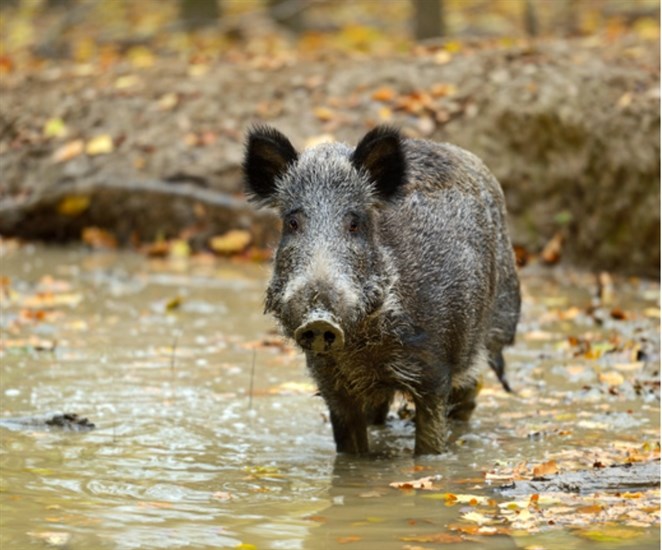
A feral pig in its preferred habitat.
Image Credit: SUBMITTED/ Columbia Shuswap Invasive Species Society
March 05, 2024 - 5:45 PM
As a result of the 2023 wildfires, domestic pigs could be roaming the wild, multiplying and breeding with wild boars, causing a whole host of issues for the environment, local economy and health of Shuswap's residents.
“We're encouraging folks to be aware that domestic pigs might have escaped captivity during the wildfire season last summer,” Robyn Hooper, executive director of the Columbia Shuswap Invasive Species Society, told iNFOnews.ca.
The organization is reaching out to the public looking for help in reporting any sightings of feral pig activity.
So far, there haven’t been any confirmed locations, but there have been rumours of pigs escaping during the summer wildfires.
READ MORE: iN VIDEO: Nothing Happier: Pigs return to mud of Shuswap sanctuary after wildfire
“All it could take is just a couple of people's backyard pigs that can turn into feral pigs,” Hooper said. “It doesn't take very many.”
Feral pigs pose a threat to wildlife by preying on native species and out-competing them for food.
Their disruptive rooting and wallowing behaviours are also a hazard to biodiversity and can cause major economic losses through crop and infrastructure damage.
Disease is another concern.
“There has been a direct transfer of disease from wild pigs to humans numerous times in the United States,” Hooper said. “And then indirect transmission through ticks and contaminated water is also possible.”
Pigs can spread diseases like African swine fever and carry pathogens such as brucellosis and tuberculosis.
READ MORE: Shuswap wildfire activist holding forum about Bush Creek East blaze
These diseases not only impact domestic pork and cattle operations, they can also spread to human and wildlife populations.
“In terms of economic impacts, in the United States, the agricultural losses associated with wild pigs are around $1.5 billion,” Hooper said. “And then they also cite pig vehicle collisions as $36 million per year.”
Feral pigs look very similar to domestic pigs but over time they will grow a coat of dark, coarse hair and may start to grow tusks.
They vary in size and colour, but are typically brown and very large with males weighing up to 200 kilograms.
“They're large animals and they can be aggressive towards humans. So the caution is to just treat them with respect that you would for any other large animal in BC,” Hooper said.
Hunters are encouraged to steer clear hunting can encourage the pigs to spread out and form new groups that learn to avoid human activity.
“We want to ensure folks have fencing and vaccination of their farm animals to prevent the spread of disease and we want to make sure that they don't get infected by feral pigs," Hooper said. "And then the biggest thing is never to release any captive pigs into the wild that can turn feral.”
Local residents are encouraged to report any sightings of feral pigs on the Columbia Shuswap Invasive Species Society website.
To contact a reporter for this story, email Georgina Whitehouse or call 250-864-7494 or email the editor. You can also submit photos, videos or news tips to the newsroom and be entered to win a monthly prize draw.
We welcome your comments and opinions on our stories but play nice. We won't censor or delete comments unless they contain off-topic statements or links, unnecessary vulgarity, false facts, spam or obviously fake profiles. If you have any concerns about what you see in comments, email the editor in the link above. SUBSCRIBE to our awesome newsletter here.
News from © iNFOnews, 2024